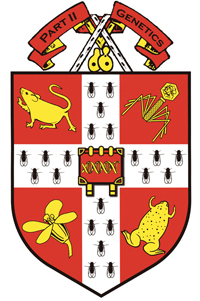The following two segments of the course are taught by members of the Department of Genetics
: Hunting the Gene
Seven lectures dealing with the principles of genetic analysis in haploid and diploid organisms, the nature of genes and the role of chromosomes in heredity together with the genetics of prokaryotes, and the advent of genetic engineering
- Early theories of inheritance: from myth and magic through Ancient Greek philosophy to the mediaeval synthesis of science and theology
- Gregor Mendel’s experiments established the foundations of modern genetics. One factor and two factor crosses: Mendel’s conclusions. The chromosome theory of inheritance
- Challenging Mendel: genetic linkage, sex linkage and variable dominance require modification and extension of the hypothesis. The development of genetic mapping. Linkage groups. Cytoplasmic inheritance: a new pattern of inheritance for genes in the mitochondria and chloroplasts
- Genetics of Prokaryotes. Fine structure gene mapping: Benzer’s analysis of the rII region in ‘phage T4. Complementation testing and counting genes. Mechanisms of gene exchange in prokaryotes: transduction, conjugation and transformation. Restriction modification systems: bacterial self defence. The advent of gene cloning. Cloning vectors: uses of plasmid and phage vectors
Professor Steve Russell : The Genetic Revolution
Six lectures covering : Recombinant DNA technology and its contribution, over the past two decades, to our understanding of cell biology and to the genetic basis of disease
- Genomes, Gene Cloning & DNA Sequencing: genome size & complexity, cloning & characterisation of DNA, restriction mapping, nucleic acid hybridisation, pcr amplification, DNA sequencing
- Genome sequencing & the Human Genome Project: Sequencing genomes, microorganism genomes, model eukaryotes, human genome, annotating genome sequence, comparative genomics
- Chromosomes & Chromosome Biology: Functional elements of chromosomes, repetitive DNA, DNA fingerprinting, gene families, unique sequence DNA, gene content
- The Genetics of Human Disease : Meiotic defects and disease, the X chromosome, autosomal genetics - Huntington’s disease & sickle cell anaemia, mapping genes, RFLPs, SNPs
- Molecular Basis of Human Disease : Tracing the defective gene - cystic fibrosis, subtractive cloning - muscular dystrophy, haplotypes, complex traits, linkage & association studies
- Genomics, Proteomics & Systems Biology: Measuring gene expression, northern blotting, DNA microarrays, genomics and cancer, microarrays for DNA analysis, proteomics, identifying proteins, mass spectrometry, protein complexes, systems biology
Dr Marisa Segal : Cell proliferation
Five lectures that aim
- To explore fundamental mechanisms and patterns of cell proliferation in single-celled and multicellular organisms;
- To introduce the eukaryotic cell cycle and its critical controls;
- To consider viral replication strategies and key cellular targets at the interface with proliferation controls; and
- To dissect the genetic basis of cancer and main molecular themes.
Practicals
Dr Marco Geymonat and Dr Marisa Segal all make significant contributions to the Practicals in the Lent Term
Further information about the course
Course Organiser : Ian Henderson, irh25@cam.ac.uk
Course Administrator : Biochemistry Teaching Office, UG-admin@bioc.cam.ac.uk
Contributing Depts : Biochemistry, Plant Sciences, Genetics and Zoology
Page updated 31/07/2025

